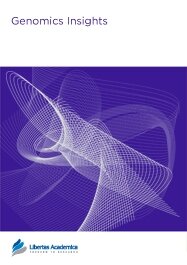

Publication Date: 03 Sep 2014
Type: Original Research
Journal: Genomics Insights
Citation: Genomics Insights 2014:7 13-22
doi: 10.4137/GEI.S15522

Aiming at generating a comprehensive genomic database on Elaeis spp., our group is leading several R&D initiatives with Elaeis guineensis (African oil palm) and Elaeis oleifera (American oil palm), including the whole-genome sequencing of the last. Genome size estimates currently available for this genus are controversial, as they indicate that American oil palm genome is about half the size of the African oil palm genome and that the genome of the interspecific hybrid is bigger than both the parental species genomes. We estimated the genome size of three E. guineensis genotypes, five E. oleifera genotypes, and two interspecific hybrids genotypes. On average, the genome size of E. guineensis is 4.32 ± 0.173 pg, while that of E. oleifera is 4.43 ± 0.018 pg. This indicates that both genomes are similar in size, even though E. oleifera is in fact bigger. As expected, the hybrid genome size is around the average of the two genomes, 4.40 ± 0.016 pg. Additionally, we demonstrate that both species present around 38% of GC content. As our results contradict the currently available data on Elaeis spp. genome sizes, we propose that the actual genome size of the Elaeis species is around 4 pg and that American oil palm possesses a larger genome than African oil palm.
PDF (3.17 MB PDF FORMAT)
RIS citation (ENDNOTE, REFERENCE MANAGER, PROCITE, REFWORKS)
BibTex citation (BIBDESK, LATEX)

Recently we published a paper describing cloning of a new kinase gene, MLK4, in Genomics Insights. I was impressed by the prompt processing and speed of publication. The comments from the reviewers allowed me to improve the paper significantly. The reviews were scientifically deep and objective, which is very valuable because in many journals decisions to publish or not to publish are very unfair and subjective. I highly recommend that other ...
Facebook Google+ Twitter
Pinterest Tumblr YouTube